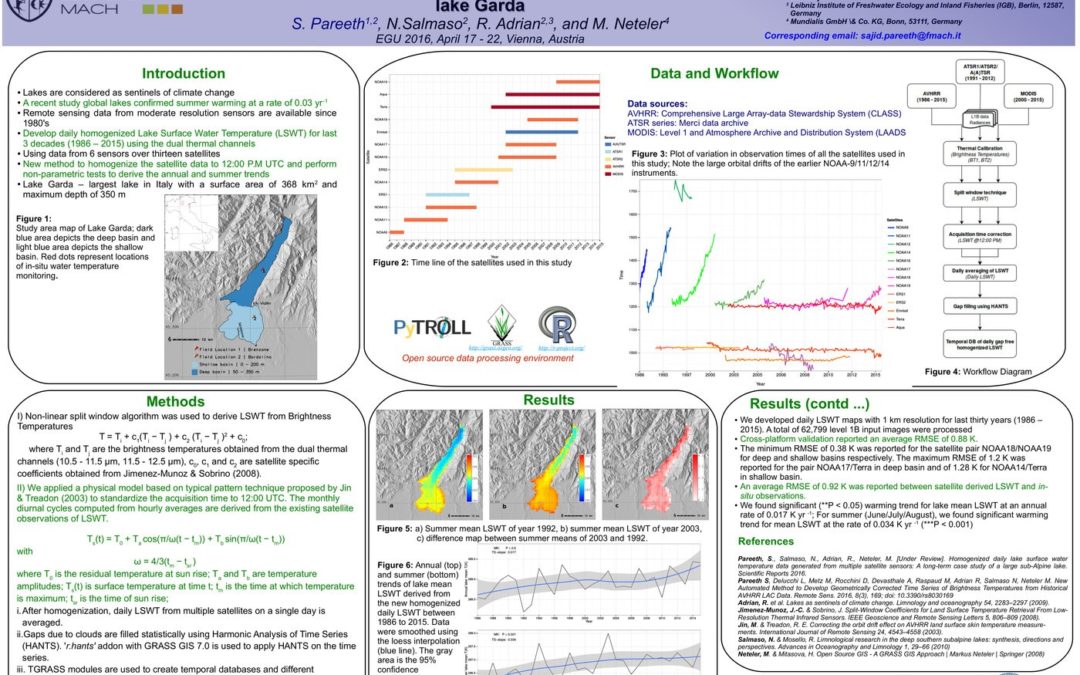Written by Sajid Pareeth from Fondazione Edmund Mach, Italy.
I did my PhD research at Fondazione Edmund Mach from February 2013 to July 2016, during which I was fortunate to receive travel support from IRSAE mobility grant to attend conferences and workshops. These opportunities led to successful presentations, vast outreach of my research and most importantly new collaborations. Such new collaborations had a very positive impact on my PhD, helping me to successfully achieve the milestones. I defended my thesis on July 2016 at Freie Universitat, Berlin. This report is on IRSAE supported trip to a short term research visit to UNESCO-IHE (Institute of Water) in Delft, Netherlands and to attend European Geosciences Union’s (EGU) annual conference in Vienna, Austria.
My PhD topic was on “Trends in surface temperature from new long–term homogenized thermal data by applying remote sensing techniques and its validation using in-situ data of five southern European lakes” where I used historical satellite data to quantify the warming of five large lakes in Northern Italy. My supervisors at FEM were Dr. Markus Neteler and Dr. Nico Salmaso, while Dr. Rita Adrian was my academic supervisor at Freie Universitat Berlin. In the beginning of year 2016, I got an invitation from Dr. Charlotte De Fries of UNESCO-IHE to visit their institute in Delft, Netherlands and discuss possible collaboration. In the mean time I was also preparing to present my results at EGU 2016 in Vienna. I combined these two trips and requested for partial funding to IRSAE which was granted.
During the research visit at UNESCO-IHE (April 4 – 16, 2016) we were discussing on the proposal for Marie-Curie COFUND program, and finalized on a topic about investigation of disappearing large lakes and its ecological consequences using Remote sensing techniques. Later 2016, my proposal got accepted and I am moving to Netherlands this April 2017, as a Marie Curie Postdoc. I will be studying about the disappearance of 5 large lakes situating at different parts of the globe (Central Asia, Africa, South America) using historical satellite data and linking the causes and consequences. I am thankful to IRSAE for the opportunity to visit the institute last year, which helped me to concrete our collaboration and to give better outline of the proposal which later got accepted.
Second part of my visit was to attend EGU 2016 (April 17 – 22, 2016) in Vienna where I had a poster presentation of my results. EGU is the biggest geosciences conference in Europe where around 14 000 people attend every year. My contribution was titled: “New homogenized daily lake surface water temperature data of three decades from multiple sensors confirm warming of large sub-alpine lake Garda”. Here I presented the new method to develop long-term time series of Lake Surface Water Temperature for the study lakes. Given the difficulty with processing older satellite data of eighties, my method drew attention of many visitors. Along with the method, I also presented the first results of lake warming where we found that the Lake Garda during summer is warming at the rate of 0.035 °C per year, according to the newly developed thirty years of data. The poster was well received and got many useful feedback on my work. I was happy that my poster was strategically positioned among big players in the same field attracting some good number of visitors. Being the final year of my PhD, these two visits were highly relevant and brought a larger positive impact to my work and career.
Looking back, I am really thankful to IRSAE for accepting my requests for mobility grants which made my PhD truly eventful. I strongly believe that all those trips, meeting people, presenting results, seeking answers to solve issues, are all integral part for a successful PhD research. In my case, it would not have been possible with out these additional support from IRSAE.
Thank you
Sajid Pareeth



